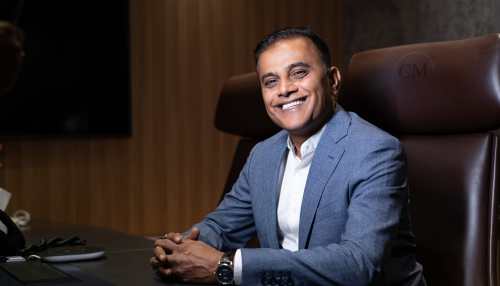- News>
- Business
Beyond Threads To Stents: Meet Dr Manish Doshi, A Textile Engineer Who Wove India`s Billion-Dollar Medical Revolution

Manish Doshi embarked on his journey by working for five months in the textile industry at Mafatlal Industries, Navsari, as a weaving superintendent, right after completing his bachelor`s in engineering with a specialization in Textile Technology.
Imagine a weaving superintendent, someone skilled in textile engineering, crafting a billion-dollar revolution in the field of medical technology. This remarkable tale is about Dr Manish Doshi, a businessman who proved that success goes beyond just financial gain and includes compassion for others as well.
Who is Dr Manish Doshi?
Born on October 18, 1968, in Gujarat's Anand, to Indulal and Kokilaben Doshi, Manish Doshi's early education at D N High School, Gamdi Vad, Anand, laid the foundation for his subsequent academic pursuits, followed by earning a degree in B.E. Textile Technology from Baroda's M.S. University. Notably, his father Indulal Amritlal Doshi served as an accounts manager at Amul Dairy, thus instilling early values of hard work and determination. Manish Doshi is married to social activist Aparna Doshi, and they have two children.
Early Days and Beginnings
Manish Doshi embarked on his journey by working for five months in the textile industry at Mafatlal Industries, Navsari, as a weaving superintendent, right after completing his bachelor's in engineering with a specialization in Textile Technology. However, he decided to leave this role and ventured into his own import-export business. His first entrepreneurial endeavour, though on a small scale, involved delivering raw materials to the paint industry within Gujarat. His initial consignment, worth Rs 3,500, marked the start, back in those days. Gradually, this venture transformed into a chemical trading business for the textile industry, landing him in Surat. Furthermore, Dr Doshi expanded his entrepreneurial portfolio with businesses like a metal sheet laser cutting factory, laser cutting & diamond cutting machines, and even an amusement park.
The Medical Technology Leap
Amidst his varied ventures, Dr Doshi encountered the challenges faced by workers. In 1998, when heart angioplasties gained prominence over bypass surgeries, he stumbled upon a metallic spring-like object during his involvement with laser and diamond-cutting machines. This seemingly insignificant object turned out to be a 'Heart Stent'. At that time, no Indian company produced these devices, leading to high import costs due to complete dependency on imports of stents. Driven by empathy and a desire to help, Manish Doshi pivoted from his existing businesses to focus on developing and manufacturing stents domestically. He established India's first coronary stent manufacturing company. Through collaboration with medical experts and his laser technology partner, they succeeded in creating the country's first indigenous stent.
From Risk to Revolution: Founding Concept Medical
This journey was not all breezy & far from smooth. Months later, Dr Doshi had to abruptly part ways with his partner, leaving behind the stent business. After this, he founded Concept Medical with partners from Brazil. Recognizing the gaps caused by limitations in drug and polymer use in stents, Dr Doshi concentrated on developing drug delivery technologies. With a small team in a modest 4x4 chamber serving as their laboratory, he founded Concept Medical in 2008. They invented the world's first 'Sirolimus drug-coated balloon' for which the Concept Medical earned the esteemed National Technology Award from then-President Ramnath Kovind. Dr Doshi's contributions also resulted in an honorary doctorate for his advancements in the field of medical intervention. For his contribution in the field, Dr Doshi was awarded ‘Champions of Change Award Telangana' by Telangana Governor Tamilisai Soundararajan and an Honorary Doctorate for his work in the field of Drug Delivery application for cardiovascular devices using nanotechnology.
A Global Unicorn Emerges
While Dr Doshi and Concept Medical confronted multiple challenges, including skepticism, patent infringement lawsuits, and financial constraints, their experiences paved the way for triumph. Today, Concept Medical stands tall as a billion-dollar company and a global unicorn. Dr Doshi's innovations are approved by CE and are available in over 75 countries. His clinical trials program encompasses over 35 studies, involving over 25,000 patients.
